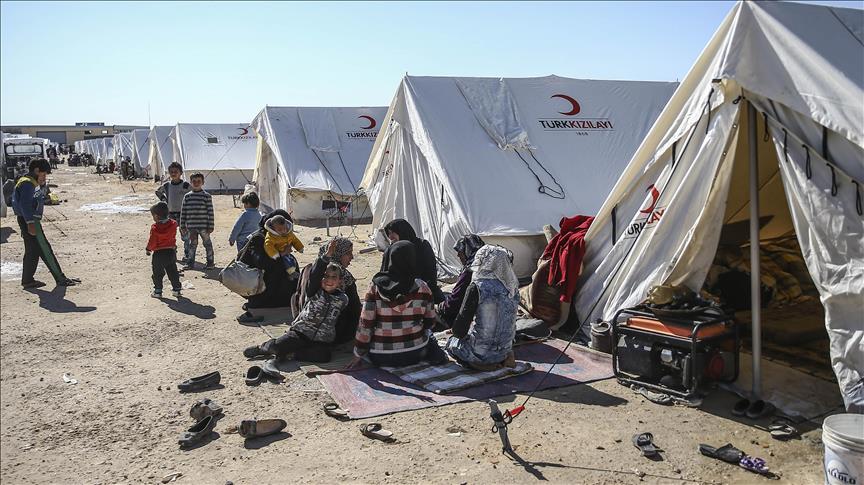Russia fuels refugee crisis to harm EU, Turkey: experts
Several analysts and diplomats believe that Russia hits civilian targets in Syria to exacerbate refugee crisis
 ALEPPO, SYRIA - FEBRUARY 09: Syrians who flee the attacks of Syrian and Russian air forces to residential areas on Hayan, Haritan, Kafr, Anadan, Kafr Naya, Mayir and Ihris districts of Syria, try to live at tents and open areas at the Bab al-Salameh border crossing on Turkish-Syrian border near Azaz town of Aleppo, Syria on February 09, 2016.
( Fatih Aktaş - Anadolu Ajansı )
ALEPPO, SYRIA - FEBRUARY 09: Syrians who flee the attacks of Syrian and Russian air forces to residential areas on Hayan, Haritan, Kafr, Anadan, Kafr Naya, Mayir and Ihris districts of Syria, try to live at tents and open areas at the Bab al-Salameh border crossing on Turkish-Syrian border near Azaz town of Aleppo, Syria on February 09, 2016.
( Fatih Aktaş - Anadolu Ajansı )
London
LONDON
As the refugee crisis keeps Europe in turmoil, several analysts and diplomats believe that Russia has been hitting civilian targets in Syria in order to instigate further migrations that expose Turkey and Europe to risk.
“He [Russian President Vladimir Putin] wants to exacerbate the refugee crisis and use it as a weapon to divide the transatlantic alliance and undermine the European project,” U.S. Senator John McCain said during the Munich security conference, just hours before deadly airstrikes on civilian targets by Russian jets Monday.
More than 30 civilians, including children were killed in two hospitals operated by Medecins Sans Frontieres (MSF - Doctors Without Borders) when they were bombarded by Russian air force, despite repeated calls from the international society to cease strikes on such targets.
Steven Blockmans, a senior researcher at the Centre for European Policy Studies – a Brussels-based think tank – says weakening the EU is actually Kremlin policy.
“It’s Putin’s Russia’s interests to weaken the EU,” Blockmans tells Anadolu Agency. “He’s seen the negative impact the refugee crisis stemmed from Syria.”
Blockmans argues that Putin has been using the crisis in Syria as a counter to EU sanctions against Russia that followed the conflict in eastern Ukraine and the annexation of Crimea in 2014.
He does so “by offering support [to the Syrian regime] through his air bombardments and at the same time creating a flow of refugees, putting pressure especially on Angela Merkel’s position,” Blockmans said.
Germany has taken in more than 1 million refugees in 2015, a move which has left Chancellor Merkel open to criticism from within her own coalition.
Following a trip to Moscow earlier this month, one of Merkel’s coalition allies, Horst Seehofer the premier of the state of Bavaria, called for a change in diplomatic relations with Moscow. But the German chancellor has recently indicated conditions on the ground were not met to proceed to a lifting of sanctions.
In December 2015, the EU decided to keep economic sanctions against Russia until the end of July 2016.
President of the International Institute for Peace, Hannes Swoboda also argues that Russia has had a secret agenda all along in Syria.
Former MEP Swoboda says that he has been “concerned of at least one hidden agenda of Russians, which is an intent to make problems for the EU”.
“But nevertheless [the EU needs] a common strategy against individual countries trying to win a war which no one can win and which is continuing enormous destruction and killings,” he said.
Turkey, home to the world’s biggest refugee population with more than 2.5 million Syrians, has also called Russian actions “war crimes”.
"It is deplorably observed that instead of halting their airstrikes, Russians especially have escalated these attacks in Syria and targeted civilians, hospitals, schools," said a Turkish foreign ministry statement.
On Monday, Russian warplanes targeted two schools and one hospital in Azaz and another hospital in Idlib managed by Geneva-based medical charity Doctors Without Border.
The foreign ministry statement said more than 30 people including women and children had been killed.
Michael Stevens, an expert from the British think tank RUSI (The Royal United Services Institute for Defence and Security Studies) says that Moscow does not calculate the results of its actions.
"I think it’s more a question of the fact that they're simply fighting a war to win, with little thought to humanitarian consequences," Stevens told Anadolu Agency.
And, despite last week’s “cessation of hostilities” announcement at the security conference held in Munich attended by representatives of more than 20 countries, Russia continues targeting non-Daesh and civilian targets in Syria.
Prime Minister Dmitry Medvedev refuted claims that Russia kills civilians in airstrikes in Syria, and said there was no evidence that would prove the accusations.
Still, Moscow’s actions in Syria have garnered widespread criticism from western powers
U.K. foreign secretary Phillip Hammond said: “Russia, in particular, claims to be attacking terrorist groups and yet consistently bombs non-extremist groups including civilians. If this agreement is to work, this bombing will have to stop: no cessation of hostilities will last if moderate opposition groups continue to be targeted.”
"There's one man on this planet who can end the civil war in Syria by making a phone call, and that's Mr. Putin," the secretary added.
France and Germany have made similar comments.
In a speech in Munich, French Prime Minister Manuel Valls said: "France respects Russia and its interests [...] But we know that to find the path to peace again, the Russian bombing of civilians has to stop."
“We’ve seen this movie before in Ukraine,” noted John McCain in Munich. “Russia presses its advantage militarily, creates new facts on the ground, uses the denial and delivery of humanitarian aid as a bargaining chip, negotiates an agreement to lock in the spoils of war and then chooses when to resume fighting.”
“This is diplomacy in the service of military aggression and it is working because we are letting it,” the former Republican presidential candidate said.








